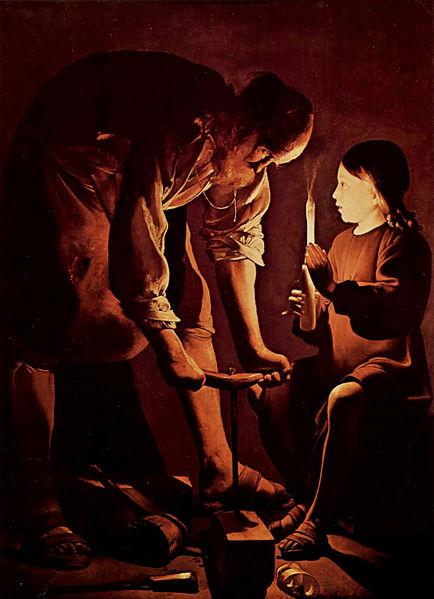|
Tektōn The boy holds light in his hands—a candle-- for his father, who bends over an auger, drills a framing joist by the taper’s flame. Why does he work so late into evening? It must be winter. The old man’s bald head illuminated, his child’s profile brilliant, watching how the work of being human is accomplished, how tool resembles letter, zayin, which can be used to make words, which were used in the beginning. That letter, vertical topped by horizontal, crossed, useful in the building of scaffolds and houses, marks the lower center of the frame. A symbol? A premonition? But the boy’s eyes meet his father’s. He seeks human connection, and Joseph returns his gaze with something like sorrow. Is this not the carpenter’s son? the Pharisees will ask, empty of understanding, unaware of miracle, expecting a gilded messiah, not flesh, not child. Not a man who fells cedars for rafters, employs a drawknife to craft oxen yokes, not the person made, like us, from earth and nourished by trees, ungilded, plain, made by hand, carved with chisel and mallet metaphorically—each of us with distinct flaws the maker sees, dismayed, and recognizes, with love. That wood shaving, curled next to the boy’s left foot, suggests the infinite, which he knows; his task here is to be human. Ann E. Michael Ann E. Michael grew up loving art and art museums but, after many years of art school, realized she lacked the temperament and ability to be an artist. She also loved literature and writing, however, and now directs the writing centre at DeSales University. She's the author of the collection Water-Rites, and her latest chapbook, Barefoot Girls, is forthcoming from Prolific Press.
0 Comments
Your comment will be posted after it is approved.
Leave a Reply. |
The Ekphrastic Review
COOKIES/PRIVACY
This site uses cookies to deliver your best navigation experience this time and next. Continuing here means you consent to cookies. Thank you. Join us on Facebook:
July 2024
|




